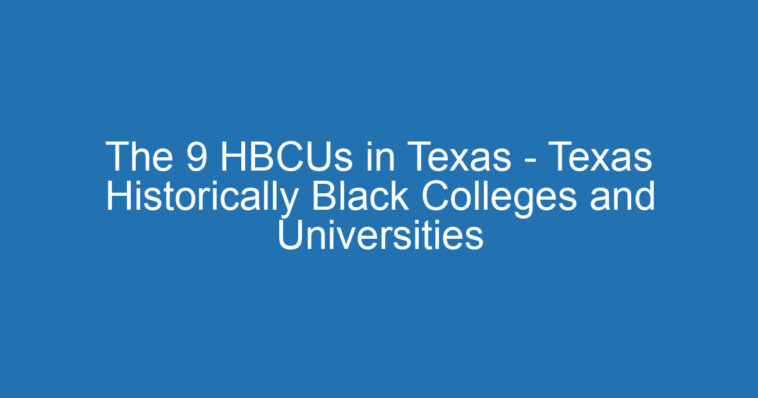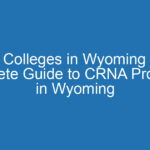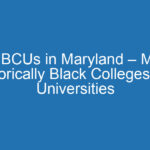Texas Historically Black Colleges and Universities
Is There a Hbcu in Texas? – Yes, Texas is home to 9 Historically Black Colleges and Universities (HBCUs), with each school located on the eastern half of the state. These HBCUs in Texas have a rich history of providing education access to black students excluded from white colleges during the era of legal segregation, but now students from all races attend these schools.
Historically Black colleges and universities (HBCUs) are institutions that were established prior to 1964 with the primary mission of educating Black Americans and that are accredited by a nationally recognized accrediting association. These higher education institutions were established specifically to serve the African American community and provide educational opportunities for black students during a time when many other colleges and universities were segregationist and excluded black students.
HBCUs have a long and important history in the United States and have played a vital role in the education and advancement of African Americans. Before the Civil War, public policies prohibited teaching blacks in various parts of the country.
A significant part of the HBCU’s mission in the early years was to provide elementary and secondary schooling for newly freed slaves who had no previous education. It was not until the early 1900s that HBCUs began to offer courses and programs at the postsecondary level. Today, there are more than 100 HBCUs in the United States, including public and private institutions offering four-year and two-year degree programs across the united states.
HBCU Colleges In Texas

HBCUs in Texas offers a wide range of academic programs and are strongly committed to promoting diversity and inclusion. As HBCUs continue to be an important part of the higher education landscape for Texans, let’s explore the nine HBCUs in Texas.
| Historically Black Colleges and Universities in Texas | Type | Program Length | Acceptance Rate | Location |
| Huston-Tillotson University | Private | 4-year | 56% | Austin, TX |
| Jarvis Christian University | Private | 4-year | 100% | Hawkins, TX |
| Paul Quinn College | Private | 4-year | 62% | Dallas, TX |
| Prairie View A&M University | Public | 4-year | 76% | Prairie View, TX |
| St. Philip’s College | Public | 2-year | 100% | San Antonio, TX |
| Southwestern Christian College | Private | 2-year | 100% | Terrell, TX |
| Texas College | Private | 4-year | 100% | Tyler, TX |
| Texas Southern University | Public | 4-year | 66% | Houston, TX |
| Wiley College | Private | 4-year | 100% | Marshall, TX |
Huston-Tillotson University
Huston-Tillotson University is a private HBCUs located in Austin, Texas. It was founded in 1875 as Tillotson College and merged with Huston College in 1952 to form Huston-Tillotson University. The university is affiliated with The United Methodist Church, the United Church of Christ, and the United Negro College Fund (UNCF), and it offers a range of undergraduate and graduate degree programs in fields such as science, business, criminal justice, education, psychology, and liberal arts.
Huston-Tillotson University has a diverse student body and a commitment to promoting cultural understanding and social justice. The university is accredited by the Southern Association of Colleges and Schools Commission on Colleges (SACSCOC) to award associate, baccalaureate, and master’s degrees.
Huston-Tillotson University, known for its departments of education and music, has an acceptance rate of 56% and an average cost of attendance after financial aid standing at just over $15,000 a year. The private HBCU offers a close-knit educational experience with a student-to-faculty ratio of 14 to 1 and a total undergraduate enrollment of just over 1,000 students.
Jarvis Christian University
Jarvis Christian University is a private HBCUs located in Hawkins, Texas. The college was founded in 1912 and is affiliated with the Christian Church (Disciples of Christ). The institution owes its existence to the philanthropy of white Disciples of Christ and the initiative of African American Disciples of Christ.
Jarvis Christian University offers a range of associate, baccalaureate, and master’s level degree programs in areas such as science, social work, business, and arts. Jarvis Christian University is known for its focus on providing quality education to students from diverse backgrounds and commitment to community service.
With an acceptance rate of 100% and the average cost of attendance after financial aid standing at appr. $15,000 yearly, Jarvis Christian University is one of the top HBCUs in Texas. The institution, which is accredited by the Southern Association of Colleges and Schools Commission on Colleges (SACSCOC), enrolls appr. 719 undergraduate students.
Paul Quinn College
Paul Quinn College is a private HBCUs located in Dallas, Texas. The college was founded in 1872 and is affiliated with the Association of Institutions of Higher Education of the African Methodist Episcopal Church. It is the oldest historically black college west of the Mississippi River and the nation’s first urban work college.
Paul Quinn College is accredited by the Trnation’snal Association of Christian Colleges and Schools (TRACS). It offers a range of undergraduate programs in areas such as business, health, religion, criminal justice, and liberal arts. With 468 undergraduate students, Paul Quinn College has an acceptance rate of 62%, and the average cost of attendance after financial aid stands at over $14,000 yearly.
Prairie View A&M University
Prairie View A&M University (PVAMU) is a public hbcu located in Prairie View, TexaPhilip’sed in 1876; the university is one of Texas’s two land-grant universities. It is the second-oldest public institution of higher education in Texas.
Prairie View A&M University is accredited by the Southern Association of Colleges and Schools Commission on Colleges (SACSCOC) to award baccalaureate, master’s, and doctorate degrees. Through its eight colleges and schools, PVAMU caters to over 8,000 diverse students offering more than 70 degree programs in fields such as nursing, engineering, natural sciences, business, the arts, and criminal and juvenile justice.
A member of The Texas A&M University System and best known for producing engineers, nurses, and educators, Prairie View A&M University has an acceptance rate of 76%, with the average cost of attendance after financial aid standing at just over $16,000 a year.
St. Philip’s College
St. Philip’s College is a public community college in San Antonio, Texas. The college was founded in 1898 and is a member of the Alamo Colleges District, and is accredited by the Southern Association of Colleges and Schools Commission on Colleges (SACSCOC) to award associate degrees and certificates.
As a Historically Black College and Hispanic Serving Institution, St. Philip’s College is a vital facet of the community, responding to the needs of a population rich in ethnic, cultural, and socio-economic diversity. The college is known for its focus on serving the community’s needs and its commitment to providing quality education to students from diverse backgrounds.
St. Philip’s College offers a range of associate’s degree and certificate programs in areas such as Culinary Arts, Nursing, Vehicle Maintenance & Repair Technology, and Liberal Arts and Sciences, as well as continuing education and workforce training. With 8,866 students, St. Philip’s College has an open admission policy (acceptance rate of 100%), and the average attendance cost after financial aid is over $6,000 yearly.
Southwestern Christian College
Southwestern Christian College is a private, historically black Christian college in Terrell, Texas. Founded and sponsored by members of Churches of Christ, Southwestern Christian College is accredited as a four-year (level II) educational college (limited to Bachelor’s degree in Bible and Religious Education) with a two-year associate program in the liberal arts.
Southwestern Christian College is accredited by the Commission on Colleges of the Southern Association of Colleges and Schools to award Associate and Bachelor level degrees. With 84 undergraduate students, Southwestern Christian College has an open admission policy (acceptance rate of 100%), and the average cost of attendance after financial aid stands at over $8,000 yearly.
Texas College
Texas College is a private HBCUs located in Tyler, Texas. It was founded in 1894 by a group of CME ministers and is affiliated with the Christian Methodist Episcopal Church. The Southern Association of Colleges and Schools Commission on Colleges (SACSCOC) accredited the institution to award Associate of Arts, Bachelor of Arts, and Bachelor of Science degrees.
Texas College offers 12 baccalaureate degree programs and two associate degree programs within four divisions: business & social sciences, general studies & humanities, interdisciplinary studies (teacher education), and natural & computational sciences. With 764 undergraduate students, Texas College has an open admission policy (acceptance rate of 100%), and the average cost of attendance after financial aid stands at over $15,000 yearly.
Texas Southern University
Texas Southern University (TSU) is a public hbcu located in Houston, Texas. It was founded in 1927 and is the largest HBCUs in Texas. The university is accredited by the Commission on Colleges of the Southern Association of Colleges and Schools to award baccalaureate, master’s, and doctoral degrees.
TSU offers more than 100 undergraduate and graduate programs and concentrations in various fields, such as business, finance, education, health, law, and the arts and sciences. The university is also home to the Thurgood Marshall School of Law, one of the nation’s top-ranked law schools.
Nestled upon a sprawling 150-acre campus with a student body of over 7,000 students, Texas Southern University is one of the nation’s largest historically black universities. The university has an acceptance rate of 66%, and the average cost of attendance after financial aid stands at appr— $17,000 yearly, making the institution one of the top HBCU Colleges In Texas.
Wiley College
Wiley College is a private, historically black liberal arts college located in Marshall, Texas. It was founded in 1873 and is affiliated with the United Methodist Church. It is accredited by the Southern Association of Colleges and Schools Commission on Colleges (SACSCOC) and is nationally accredited by the Accreditation Council for Business Schools and Programs (ACBSP).
The college offers a variety of undergraduate and graduate degree programs in fields such as business, education, and the arts and sciences. With 615 undergraduate students, Wiley College has an open admission policy (acceptance rate of 100%), and the average cost of attendance after financial aid stands at over $14,000 yearly.
Best HBCUs in Texas
There are always a lot of factors to consider when ranking the best colleges. Our list of best HBCUs in Texas below is based on some of these factors, including academic reputation, student outcomes, faculty resources, financial resources, and student diversity.
| Ranking | Best HBCUs in Texas |
|---|---|
| 1 | Prairie View A&M University |
| 2 | Texas Southern University |
| 3 | Huston-Tillotson University |
| 4 | Wiley College |
| 5 | Jarvis Christian College |
| 6 | Texas College |
| 7 | Southwestern Christian College |
| 8 | Paul Quinn College |
| 9 | St. Philip’s College |
FAQ About HBCUs In Texas
How Many HBCUs are in Texas?
Texas Southern University
Prairie View A&M University
Texas College
Wiley College
Huston-Tillotson University
Jarvis Christian College
Paul Quinn College
Southwestern Christian College
St. Philip’s College
Which is the Oldest HBCU in Texas?
Paul Quinn College was founded in 1872 and is one of the oldest HBCUs in the United States. The second oldest historically black college and university (HBCU) in Texas is Wiley College, founded in 1873.
What is the #1 HBCU in Texas?
All 9 Texas Historically Black Colleges and Universities are generally considered to be high-quality institutions but based on this ranking methodology, the #1 HBCU in Texas is Prairie View A&M University.
Public Hbcu in Texas
1. Texas Southern University
2. Prairie View A&M University
3. St. Philip’s College
The Largest HBCU in Texas
Prairie View A&M University is the largest HBCU in Texas in terms of enrollment and is one of the largest HBCUs in the United States. It was founded in 1876 and has a diverse student body with over 8,000 undergraduate and graduate students offering Bachelor’s, master’s, and doctoral degree programs in over 70 areas of study.
Is Texas A&M University an HBCU?
Texas A&M University is a public research university in College Station, Texas. It was founded in 1876 and has a diverse student body with over 70,000 undergraduate and graduate students.
Private Hbcu in Texas
1. Texas College
2. Wiley College
3. Huston-Tillotson University
4. Jarvis Christian College
5. Paul Quinn College
6. Southwestern Christian College
Cheapest HBCU in Texas
According to the U.S. Department of Education – College Scoreboard, the two cheapest HBCUs in Texas is St. Philip’s College, with an average annual cost of $6,829 after aid, and Southwestern Christian College, with an average yearly cost of $8,495 after aid.
HBCUs have lower tuition and fees than other colleges and universities, particularly private institutions. It is always a good idea to research the costs of attending a particular college or university and consider all available options for financial aid and scholarships before deciding.
Hbcu in Texas with Nursing Programs
1. Prairie View A&M University – B.S. Nursing
Its College of Nursing offers an undergraduate B.S. degree in Nursing. The BSN program is a four-and-a-half-year program that prepares individuals who can practice professional nursing in a variety of clinical settings and who are prepared to continue their education through graduate studies.
RN-BSN Concentration – The RN-BSN program prepares Registered Nurses with an Associate Degree in Nursing or a Diploma in Nursing to acquire a Bachelor of Science Degree in Nursing in 12 months. Applicants must complete 63 credit hours of general studies and liberal arts courses, of which many of the course credits were earned in preparation for the R.N.
LVN-BSN Concentration – Licensed Vocational Nurses (LVNs) who seek admission to the LVN-BSN Program must meet the same lower division requisites and degree requirements as generic students. Applicants are evaluated individually and must complete the upper-division clinical studies within five years of the initial admission date.
2. St. Philip’s College – Vocational Nursing
St. Philip’s College offers a Vocational Nursing Program that covers the fundamentals of vocational nursing, ethical and legal aspects of nursing practice, nutrition, gerontology, communication skills, body structure and function, administration of medications and solutions, medical and surgical nursing, obstetrical nursing, pediatric nursing, mental health nursing, and professional development.
The program is 12 months long and prepares students to sit for the National Council Licensure Examination for Practical Nursing (NCLEX-PN) through the Texas Board of Nursing. Passing this exam certifies the graduate to practice as a Licensed Vocational Nurse.
The St. Philip’s College Vocational Nursing program is approved by the Texas Board of Nursing and the Texas Higher Education Coordinating Board to award a Certificate of Completion in Vocational Nursing.




